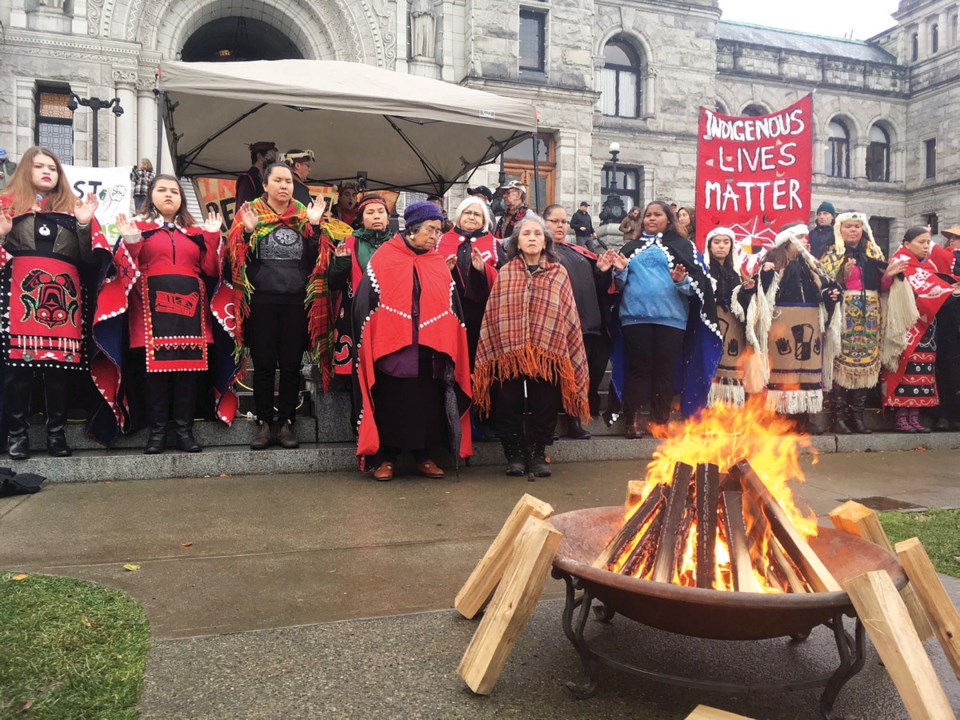First Nations protesters danced and drummed around a crackling fire in front of the B.C. legislature Thursday, calling for an end to open-net fish farms.
Leaders of the protest, which drew about 200 supporters, say now that the NDP says it’s listening, they want to see farm tenures revoked.
Thursday marked Day 70 of the occupation of two Marine Harvest farms in the Broughton Archipelago, off northeast Vancouver Island.
“We want to thank you for observing this sacred fire, it’s important because it’s the sound of our ancestors,” said Chief Ernest Alfred, a traditional leader of the ’Namgis First Nation.
Some First Nations and environmentalists have called for the end of open-net pen fish farming for 30 years. The leaders who spoke Thursday said they’re hopeful that increasing recognition of First Nations rights, plus the new NDP government, means fish- farm licences might be revoked soon.
“When the government came to us and said they want to speak to us nation-to-nation, I got very excited. Because now we have this place behind us,” Alfred said, gesturing to the legislature building, “that says they want to talk to us in a way we’ve never been talked to before.”
Open-net fish farms allow water to flow freely between farmed salmon in pens and the ocean. Opponents say it poses an unnecessary disease risk to wild salmon, which are in decline.
Fish-farm supporters point to the economic value of the industry in B.C. and say the risk is overstated. Globally, more than 90 per cent of salmon is raised in open-net pens, a B.C. Salmon Farmers Association spokesman said in August.
In this province, “Our members have decreased their use of antibiotics and we have developed new vaccines to protect against pathogens endemic to the Pacific Ocean,” he said at the time.
Willie Moon, chief of the Musgamagw Dzawda’enuxw First Nation, said Thursday that if something doesn’t change in the next year or two, he believes the next generation won’t know wild salmon. “In the past year alone, what we caught, we couldn’t even feed our village for the winter. So I’m worried about our homelands, for our people, who depend and live on fish. We’re not going to make it through the winter without going to the outside world to buy our food,” Moon said.
“Our fish has declined so badly that I really believe that within the next two years, if we don’t get these fish farms out of the Musgamagw territory, we’re not going to have salmon. Our children aren’t going to know what we enjoyed in our time.”
Grand Chief Stewart Phillip of the Union of B.C. Indian Chiefs said the fish-farm fight is one that First Nations can win together — citing the cancellation of projects such as Northern Gateway and Pacific Northwest LNG as successes.
Federal Fisheries Minister Dominic LeBlanc and provincial representatives will meet with First Nations leaders in Alert Bay “very soon” to talk about fish farms, Alfred said.
The NDP has been criticized for interfering in the fish-farm industry since taking office. Opposition Liberals have dubbed Agriculture Minister Lana Popham the, “minister of intimidation,” for putting Marine Harvest Canada on notice that its tenure may not be renewed, then saying she would investigate a provincial fish scientist’s work.
Nanaimo NDP MLA Leonard Krog spoke at the protest. “Things have to change in British Columbia,” he said. “You have a new government in Victoria that is committed to implementing the United Nations Declaration on the Rights of Indigenous Peoples.”
Marine Harvest has said it has protocol agreements with 15 First Nations and seven First Nation-owned businesses. The company employs more than 550 people on and around Vancouver Island.



